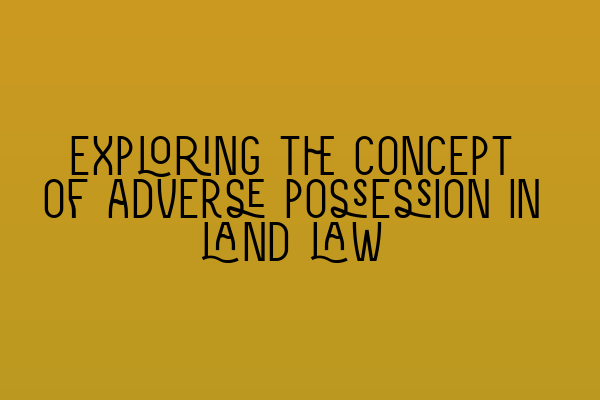Exploring the Concept of Adverse Possession in Land Law
Welcome to the blog of SQE Property Law & Land Law! In this post, we will delve into the intriguing concept of adverse possession in land law. Adverse possession refers to a legal principle in which a person can acquire ownership of another person’s property through their continuous and uninterrupted possession of that property for a specified period of time.
Adverse possession provides a mechanism for individuals who have occupied a piece of land or property for an extended period, without the legal owner taking any action, to potentially claim ownership themselves. This concept is founded on the idea of rewarding those who make productive use of neglected or abandoned land.
The Requirements for Adverse Possession
In order for adverse possession to be established, certain requirements must be met:
- Actual Possession: The claimant must physically possess the land and exercise control over it in a way that demonstrates their intention to possess the land as their own.
- Exclusive Possession: The claimant’s possession must exclude others, including the legal owner, from using or accessing the land.
- Open and Notorious Possession: The claimant’s possession of the land must be visible and obvious, indicating to others that they are asserting ownership.
- Continuous Possession: The claimant must keep possession of the land without interruption for the required period of time, which is typically 10 or 12 years.
- Uninterrupted Possession: The claimant must not have abandoned or given up possession of the land at any point during the statutory period.
It is important to note that adverse possession can only be claimed against the legal owner of the land, and not against any other party who may have a valid interest or right over the property.
The Benefits and Challenges of Adverse Possession
Adverse possession can have both positive and negative implications. On one hand, it allows for the efficient use of abandoned or neglected land, encouraging its productivity and preventing waste. It also provides a remedy for individuals who have invested time, effort, and resources into improving or maintaining the property without any interference from the legal owner.
On the other hand, adverse possession can create uncertainty in land ownership and disrupt the rights of the legal owner. It may also raise moral and ethical questions, as some argue that it rewards individuals who have essentially taken someone else’s property without their consent.
The Effects of Adverse Possession
Once adverse possession is successfully established, the legal owner’s title to the land is extinguished, and the claimant becomes the new owner. The claimant can then apply to have their name registered as the owner of the property at the Land Registry.
It is worth noting that the legal owner may have the option to take legal action to prevent adverse possession, or to seek compensation if they have suffered a loss as a result of the adverse possession claim. However, such actions can be complex and costly, requiring expert legal advice.
Conclusion
Adverse possession is a fascinating concept in land law that allows for the transfer of ownership based on the continuous and uninterrupted possession of a property. While it has its benefits in terms of land utilization, it also raises important legal and ethical considerations.
If you’re interested in further exploring property law and land law topics or preparing for the SQE (Solicitors Qualifying Examination) exams, check out our related articles:
- SQE 1 Practice Exam Questions
- SQE 1 Practice Mocks FLK1 FLK2
- SQE 2 Preparation Courses
- SQE 1 Preparation Courses
- SRA SQE Exam Dates
Thank you for reading this blog post from SQE Property Law & Land Law. We hope you found it informative and engaging. If you have any further questions or require legal assistance, don’t hesitate to reach out to our expert team.
